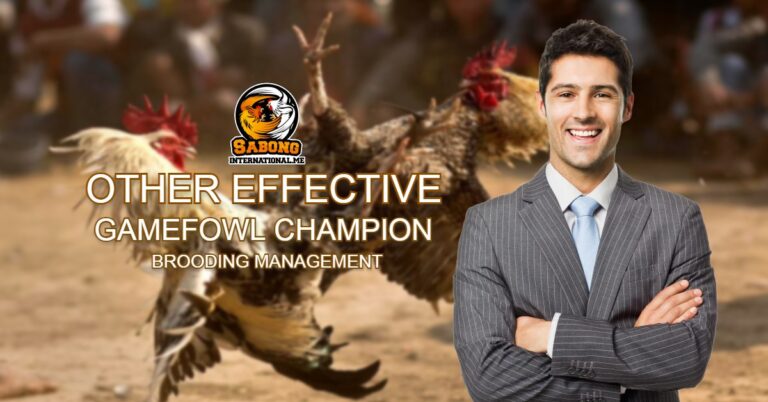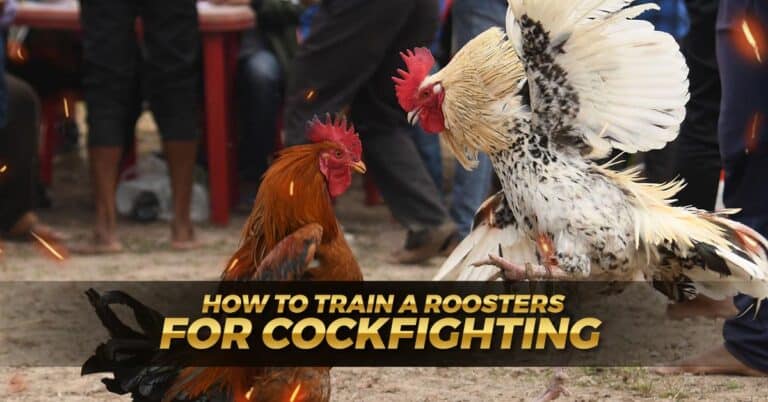Be Aware of All Things Gamefowl Coccidiosis and Other Gamefowl Farm Parasites
In this article, Sabong International helps gamefowl breeders about Gamefowl coccidiosis and other game farm parasites that can be detrimental to the health of your birds. Learn how to prevent and treat these parasites to keep your gamefowl healthy and strong.
What Results in Gamefowl Coccidiosis?
Chickens that are infected with coccidia develop coccidiosis.
All chickens have coccidia in their gastrointestinal tracts. Yep, all chickens, that’s correct. A limited number of “familiar” coccidia, however, are harmless and won’t harm a healthy, mature chicken.
However, hens may display symptoms of coccidiosis, a serious coccidia infection that can result in disease and death, when they have unfamiliar coccidia, excessive levels of coccidia, or other health problems. Coccidiosis is a serious issue when it arises. Within days, it can quickly spread throughout a flock and result in mortality.

The symptoms of Gamefowl Coccidiosis
Every chicken has some coccidia in their intestines by nature. Little amounts of coccidia parasites have no negative effects on health. The following symptoms of coccidiosis call for medical attention:

Typically, coccidiosis affects:
The causes of coccidiosis in hens
The eggs are what cause coccidiosis to spread like most intestinal parasites do (oocysts). They are implanted in the infected host’s intestines and expelled through their feces. When these eggs are eaten and then hatch in the intestine of the new host, the life cycle starts over. When the parasite grows and generates more oocysts, it penetrates the gut lining and affects digestion.
Oocysts are dispersed by chicken and avian waste. Even with the strictest planning, a wayward wild bird can spread new oocysts among your flock. The eggs can endure warm, humid environments for up to a year. You may drastically lower your birds’ exposure to coccidians and parasites by keeping your coop dry and clean.
Associated with coccidiosis outbreaks are:
Knowing the most frequent ways “new” coccidia may enter your coop is a good idea because they are the main cause of coccidiosis in healthy hens. Coccidia can spread from:
Gamefowl Coccidiosis: Prevention
Gamefowl coccidiosis can be avoided in two key ways. Young chickens should be treated until they are coccidiosis-immune. Biosecurity is a key component of good coop management. Coccidiosis must be prevented in young chickens through treatment.
While some chicken keepers, in particular, organic chicken keepers, may choose not to treat their chickens for coccidiosis, doing so is good practice. There are two distinct approaches to treatment:
Vaccination
Chickens and chicks that are bought in stores are typically given a coccidiosis vaccine. Nevertheless, before bringing them home, make sure you ask. Most parasite strains can be prevented with this immunization. Most significantly, it is never advisable to give vaccinated chicks medicinal feed because doing so will negate the preventive advantages of both treatments.
Medicated feed
Many backyard chicken keepers raise their chicks on a medicated chick starter rather than vaccinating them. A coccidiostat, often known as an anti-coccidiosis drug, is present in this meal. It is not strong enough to entirely protect the chicks from the sickness but provides enough protection to enable them to build the immunity that occurs in an adult chicken. Only chicks should be given medicated feed. Give the therapy for up to 8 weeks. This course of treatment helps protect hens from contracting coccidiosis.

Eggs from birds receiving medication through feed should not be eaten.
Coccidiosis in chickens can also be avoided with proper coop management:
Less exposure to oocysts (coccidia eggs) is also crucial for chicken health. Oocysts on surfaces and in the soil are all destroyed by sunlight, extreme cold, and hot, dry weather.
How to treat chickens with coccidiosis infections
Coccidiosis spreads swiftly, and the survival of chickens depends on prompt treatment.
Although sick birds should always be isolated right away to stop the spread of disease, the likelihood that the entire flock will become ill quickly is significant if one bird is sick.
Sulfa medications or anticoccidial medications are used to treat coccidiosis. Coccidiosis can be treated quickly and effectively with Amprolium, an anticoccidial medication that is over-the-counter and available without a prescription. When utilizing Sulfonamides, sometimes referred to as Sulfas, exercise caution. Sulfa drug overdoses can be hazardous.
POULTRY INTERNAL PARASITES
A parasite is an organism that inhabits our lives on another organism (known as the host) and benefits from that other organism’s weakness. Worms and protozoa are the two types of internal parasites that affect chickens. Low infestation levels often pose little threat and can be left untreated. Frugality, poor development, feed conversion, decreased egg production, and, in severe cases, mortality is clinical symptoms of a parasite infestation. Moreover, parasites can increase a flock’s susceptibility to illnesses or exacerbate an existing medical state.
Roundworms
In poultry, waterfowl, and wild birds, roundworms (nematodes) are typical. Ascaris sp., also known as ascarids, species of giant roundworms, Capillaria sp., species of small roundworms, capillary worms, or threadworms, and cecal worms are among the roundworm species that infest poultry (Heterakis gallinarum). The organ or organs that roundworms infect can suffer severe damage. Roundworms mostly affect the digestive system, though some can also harm the eyes or trachea (windpipe).
The most dangerous worms seen in backyard flocks are large roundworms. A severe infestation may reduce nutrition absorption, obstruct the intestines, and even result in death. Large roundworms can grow to a length of 4-1/2 inches, are easily seen with the naked eye, and are roughly the same thickness as pencil lead.

On rare occasions, they move up a hen’s reproductive system and end up in an egg. Roundworms have a direct life cycle, meaning that their worm eggs are transferred from diseased birds’ droppings to birds who eat contaminated food, drink, or feces. Moreover, earwigs, grasshoppers, beetles, cockroaches, snails, slugs, earthworms, and other insects may collect worm eggs.
These insects also referred to as intermediate hosts, transport the eggs and, when consumed by a bird, deliver the eggs to the bird. Identifying and reducing the number of intermediary hosts that chickens come into touch with aids in preventing worm infection in the animals. You should consult the US Food and Drug Administration’s (FDA) Authorized Animal Drug Products list (also known as the Green Book) for a list of currently approved wormer medications because there aren’t many of them for poultry.
It is possible to treat giant roundworms in poultry with medication containing the active ingredient piperazine, however, it is ineffective against other internal parasites in poultry. As with other drugs, read the label to find out the dosage to use and the period to wait before eating eggs or gathering meat.
Many species of tiny roundworms can harm different sections of birds and create a range of symptoms. The mucous membranes in the esophagus and crop thicken and swell as a result of the organisms that infect them. These parasites most frequently affect turkeys and game birds, and they can cause producers to lose a lot of money. In the lower intestinal tract, there are additional species of small roundworms that can cause erosion of the intestinal lining, bleeding, and inflammation.
Heavy infestations harm fertility, egg production, and growth. Severe infestations can lead to death. These worms can be spotted during necropsy if they are present in great numbers (examination after death). Without a microscope, little roundworm eggs are incredibly minute and challenging to spot in bird droppings. Levamisole-containing medications are useful for treating tiny roundworms.
Tapeworms
Some tapeworm (cestode) species infect poultry. They come in a variety of sizes, from very small (invisible to the unaided eye) to longer than 12 inches. Several flat parts make up a tapeworm. Groups of two or three parts are shed each day. Each tapeworm segment carries hundreds of eggs, and during its existence, each tapeworm can shed millions of eggs. A separate portion of the digestive tract is where each type of tapeworm attaches. The four pairs of suckers on a tapeworm’s head are used to attach itself to other organisms. Tapeworms require an intermediate host for the last stage of their life cycle.

Protozoa
Most ecosystems contain protozoa, which are single-celled organisms that include some domestic animals and humans’ parasitic infections. The Eimeria genus species of coccidia, cryptosporidium (Cryptosporidium bailey), and histones are important protozoan parasites for backyard chicken farmers (H. melegridis).
The protozoan parasites coccidia are by far the most prevalent in hens and turkeys. Gamefowl breeds are both affected by nine different coccidia species. For example, coccidia that harms chickens does not affect turkeys or other livestock because coccidia is species-specific. The digestive tract is where coccidia resides and proliferates and harms tissue.
Because of this injury, fewer nutrients and fluids are absorbed, which results in diarrhea and blood loss. Coccidiosis (coccidia infection or sickness) might make a bird more vulnerable to other serious poultry diseases, like necrotic enteritis. Nearly all poultry have cocci. With time, chicks become immune to coccidiosis, with the most serious cases occurring between three and six weeks of age. Bloody diarrhea, watery diarrhea, unusual feces, weight loss, lethargic behavior, ruffled feathers, and other symptoms of ill health are all indications of coccidiosis.
Conclusion
Gamefowl are known for their strength and agility, but like all animals, they are susceptible to diseases and parasites. One of the most common health issues that gamefowl face is coccidiosis, a parasitic disease caused by a protozoan that can infect the intestinal tract of your birds. Along with coccidiosis, there are several other game farm parasites that can affect the health of your birds. In this article, we will discuss the different types of gamefowl parasites, their symptoms, and how to prevent and treat them.










